The 7 Best EQ Pedals for Every Budget: Shape Your Tone in Seconds!
Parametric, graphic - check out our EQ picks!
Equalizers… what would we do without them?! Sound muddy? Play unshaped, characterless songs? (*shudder). And it won’t come as a surprise that even among these seven best EQ pedals, there is one best EQ pedal to rule them all. It depends on your needs! Budget, size, genre, and instrument (guitar or bass) all matter! Let’s take a look.
Our Picks for Best EQ Pedals
Considerations on the Best EQ Pedals
What is an EQ pedal even for? To shape your signal’s frequency content. This can be a tool towards the end of your pedal chain to tame some unruly low or high frequencies. Or to push the upper mids so your axe cuts through the mix.
An EQ pedal can also be a great tool in combination with distortion or overdrive pedals. Because while these often come with a tone knob, in most cases, that only allows you to cut or boost your lows or highs, respectively. With an EQ pedal, you can boost the mid-range frequencies before going into a drive or into the amp. And have just that range be distorted.
Additionally, there are considerations regarding the best EQ pedals for specific genres. From twang-y surf rock licks to heavy alternative rock to monstrous doom metal or piercing metalcore leads, these genres are mainly defined by their respective guitar sounds. And as much as choosing the right guitar, pickup, distortion, modulation, and amp / cab combination makes your sound, the best EQ pedals will greatly help in dialing it in.
Graphic vs. Parametric
If you look around, you’ll usually see two types of best EQ pedals: graphic or parametric EQs. A graphic EQ pedal often comes with 7 to 10 bands, each of which can be attenuated or boosted. These seem to be more common among EQ pedals. And their advantage is clear: dialing in the sound you’re after is intuitive.
Their main disadvantage is that their frequency bands are set. If there is a narrower band in between that you’d like to work with, there is not much you can do. In comparison, that’s one of the main advantages of a parametric EQ pedal. You can really hone in on one too resonant band, set a narrow Q factor (broadly speaking, how wide a frequency band is), and attenuate just that.
The main disadvantage of parametrics is that you often only get one to three bands per EQ pedal you can work with. Either way, these seven EQ pedals can greatly help with changing and dialing in your sound, so let’s take a look!
As always, we’ve only ranked these EQ pedals by price.
Harley Benton MiniStomp 5-Band
The Harley Benton MiniStomp 5-Band EQ is a compact, no-nonsense 5-band equalizer that earns a place among the best EQ pedals for guitarists on a budget. It offers five frequency sliders at 100 Hz, 250 Hz, 630 Hz, 1.6 kHz, and 4 kHz, each offering ±18 dB of control. Add in a level slider and true bypass circuitry, and you’ve got a simple but powerful way to tighten lows, boost mids, or tame highs.
One clear advantage of this pedal is its affordable, ultra-compact design, making it easy to squeeze onto even crowded pedalboards. For many budget-conscious guitarists, it delivers exactly what’s needed. You can get it from Thomann* for $19.50 / £17.30 /€19.90.

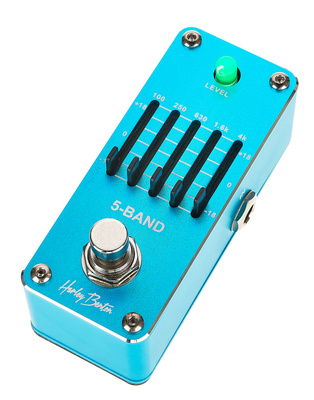
Behringer EQ 700 and BEQ700
The Behringer EQ700 and BEQ700 are budget-friendly options often listed among the best EQ pedals for players who want more control over their sound without breaking the bank. The EQ700 is voiced for guitar, with seven bands ranging from 100 Hz to 6.4 kHz. In comparison, the BEQ700 shifts that range for bass, covering 50 Hz up to 10 kHz. Both pedals feature ±15 dB of cut or boost per band, a level slider, true bypass, and flexible power options.
The choice really comes down to your instrument and tonal needs. Guitarists will find the EQ700* more naturally aligned with their frequency range, while bassists benefit from the extended low-end focus of the BEQ700*. Whether you need to cut mud, tame feedback, or push your tone forward in a mix, these Behringer EQs remain practical, reliable, and highly accessible solutions. Get them both from Thomann*.

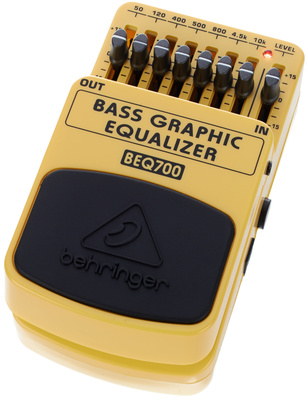

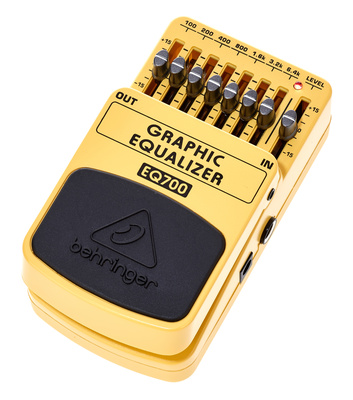
Mooer Graphic G
The Mooer Graphic G is a 5-band graphic EQ pedal that makes a strong case as one of the best EQ pedals. It features gain sliders for five frequency bands (100 Hz, 250 Hz, 630 Hz, 1.6 kHz, 4 kHz) each with ±18 dB of boost or cut, plus a master output level control.
One big advantage is how small the Graphic G is, which makes it perfect for crammed boards. On the other hand, the small size means the controls are close together; fine adjustments can be a bit fiddly, and the extreme boosts or cuts near ±18 dB can introduce noise or affect headroom noticeably, especially in more sensitive rigs. Overall, you get a lot of tonal control for its size and price. Check it out at Thomann*.

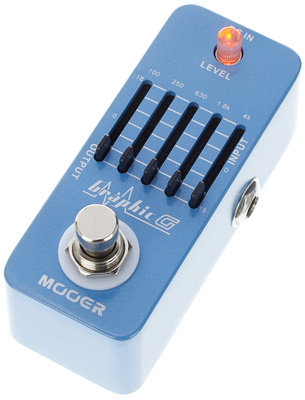
Boss GE-7 and EQ-200
The Boss GE-7 is a 7-band graphic equalizer that’s been a staple on pedalboards for decades. Its seven sliders (100 Hz → 200 → 400 → 800 → 1.6 k → 3.2 k → 6.4 kHz) each allow ±15 dB of boost or cut, plus a master level slider so you can tame or push the overall output. It’s all in a compact, rugged pedal with buffered bypass, perfect for quickly sculpting your sound.
The Boss EQ-200* is a whole different story in terms of flexibility. It offers dual 10-band EQ channels, usable in stereo, parallel, or series; three selectable frequency ranges; insert points for effects; and MIDI/expression controls. With its four memory slots, it’s built for players who want deep control and those “set-and-forget” presets for live or studio use. Both pedals are available at Thomann*.

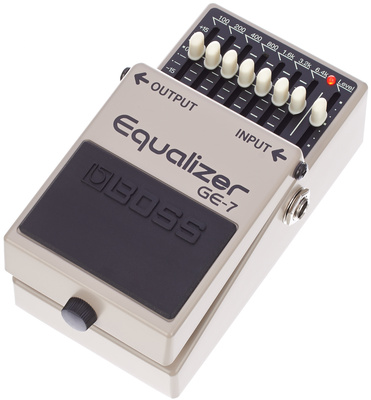

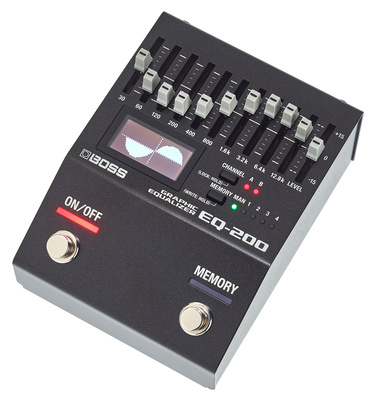
MXR Six Band and Ten Band
The MXR Six Band is a streamlined EQ pedal that covers the essentials with six sliders from 100 Hz up to 3.2 kHz, each offering ±18 dB of cut or boost. True bypass, low-noise circuitry, and a rugged aluminum chassis make it reliable on stage, while the compact format keeps things simple for guitarists who just want quick, effective tone shaping. It’s a favorite among players looking for the best EQ pedals without unnecessary complexity.
Compared to that, the MXR Ten Band* gives you ten frequency bands from 31 Hz to 16 kHz for more surgical cuts. Dual outputs, a gain slider, volume control, and 18V operation provide extra headroom make it a serious tool for both guitar and bass. Both EQ pedals are available from Thomann*.

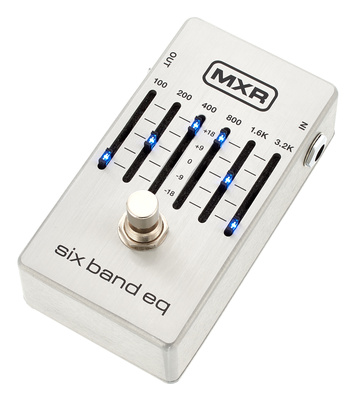

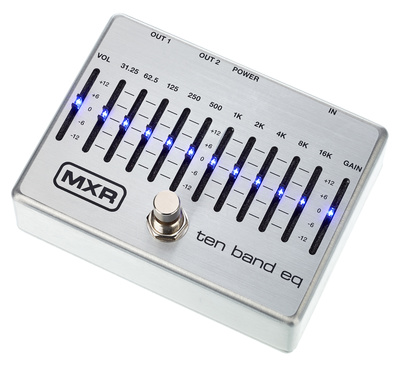
Source Audio EQ2
It does not get much more versatile and powerful than this when it comes to EQ pedals. The Source Audio SA 270 EQ2 is one of the most flexible options you’ll find among the best EQ pedals today. It offers 10 fully adjustable bands, stereo ins and outs, and the ability to run two EQ channels at once.
With 128 presets, full MIDI control, and an expression input for sweeping between settings, it’s far more than a graphic EQ. It’s a full tone-shaping workstation for guitar, bass, or even synths. Plus, you get a bright display and an onboard tuner. Quiet, transparent, and endlessly versatile, the EQ2 raises the bar for what an EQ pedal can be. It’s available from Thomann* for $295 / £259 / €299.

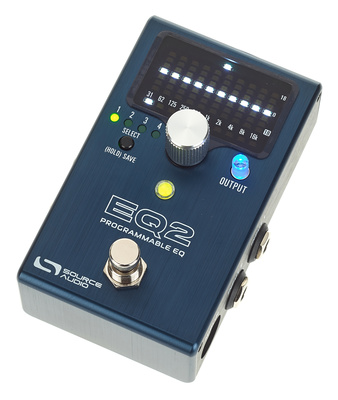
Empress Effects ParaEQ MKII, Para EQ MKII Deluxe and Bass Para EQ
While Source Audio’s EQ offers you ultimate flexibility, Empress Effects’ Para series offers you the best sound. These three pedals sound as good as high-end studio EQs. The ParaEQ MKII is Empress’s refresh of their classic parametric EQ. It offers three parametric bands with ±15 dB boost/cut each, selectable Q widths (wide, medium, narrow) per band, and a foot-switchable clean boost of up to +30 dB.
The Deluxe version* builds on the MKII by adding fully sweepable Q controls (instead of toggled presets), additional shelving filters (low-shelf, high-shelf), and high-pass/low-pass filters for more advanced tone control. Furthermore, its internal 27V design provides much greater headroom, allowing you to boost aggressively or drive distortion stages without harsh clipping. The Deluxe keeps the 3-band parametric core and the clean boost function, but gives you finer precision and more filter tools.
The recently released Bass ParaEQ* is geared specifically for bass players and low-frequency instruments. It inherits the 3-band EQ and boost/cut ±15 dB per band, but its filter ranges and shelving/high-/low-pass features are optimized for tight low end. Key features include a 10 MΩ high-impedance input (great for piezo or upright bass) and a balanced output for long cable runs. Like the Deluxe version, it also offers a mighty 27V headroom to maintain signal integrity when pushing the bottom end hard. All three pedals are available at Thomann*.

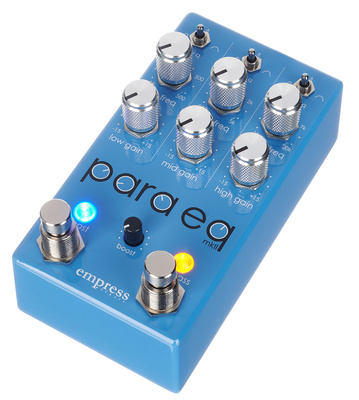

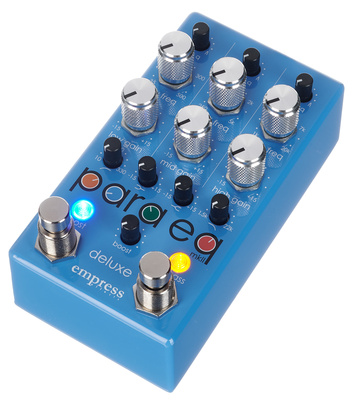

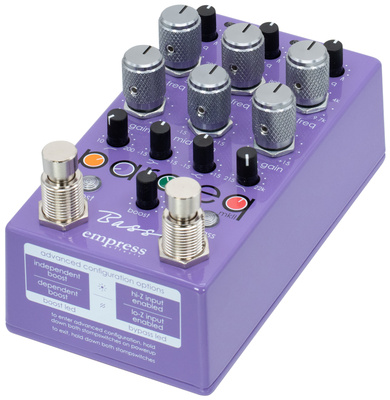
*Disclaimer: This article about the best EQ pedals contains affiliate links and/or widgets. When you buy a product via our affiliate partner, we receive a small commission that helps support what we do. Don’t worry, you pay the same price. Thanks for your support!
One response to “The 7 Best EQ Pedals for Every Budget: Shape Your Tone in Seconds!”

 4,5 / 5,0 |
4,5 / 5,0 | 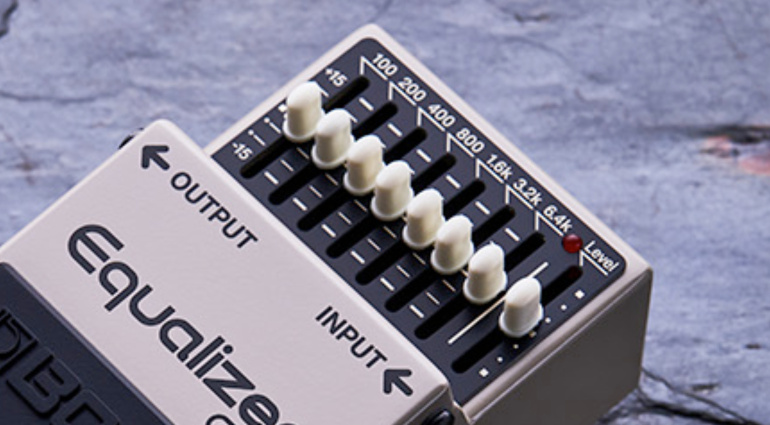


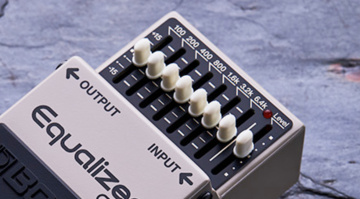

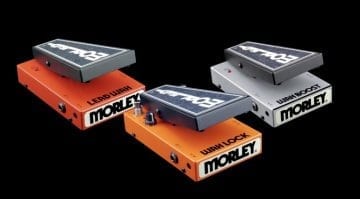
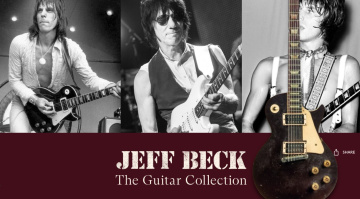
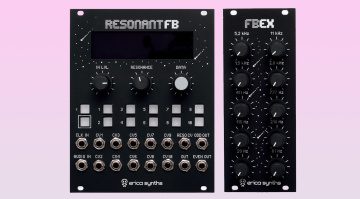
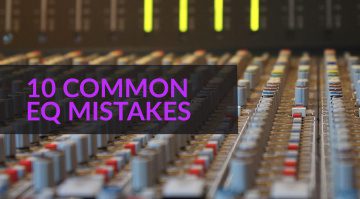

a bit silly that you mention both benton and mooer separately, which are identical, as well as ge7 and behringer’s clone which is also the same. Could have used two slots to present more versatile, unusual options (like haunted mids or fairfield’s eq) rather 2×2 duplicates..